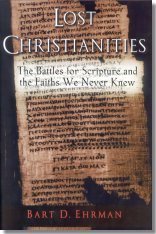
This is an interesting book for those people who haven't dedicated their lives to studying the history of Christianity. It's definitely worth reading whether you're a novice or expert, but it's written to be accessible to any reader who picks it up. There are definitely some things that you are going to get lost on if you don't already know a little bit about early Christianity, but not too much.
The main point of this book is to talk about the other versions of Christianity that once existed that were also original schools of thought (much like you can consider Pauline Christianity simply a variant, so was Gnosticism etc.) Although other books have talked about the writings that still exist that come from these variants, this book is trying to explore the Christian groups that existed "behind" those writings. If you've never heard of the Nag Hammadi library, you should read this book. If you don't know what Gnosticism is, or who the Marcionites were, or who the Ebionites were, you should read this book.
History is written by the winners, and the version of church history given to us even today is that of people who revised the truth to make it seem like the formation of modern Christianity was a natural process beginning with Jesus, continuing through the apostles and eventually to the bishops and finally spreading around the world as the basic version that we've all come to know.
The reality, however, is that a multitude of schools of thought existed almost from the beginning. Despite the picture given by the Bible, most early Christians never met Jesus or any of his "apostles". They got the message from travelling preachers who probably interjected some of their own thoughts. Even those groups that were directly associated with apostles differed in opinion. After all, Paul describes attempting to change the opinion of the two apostles (Peter and I forget who) that espoused a more Jewish-Christian viewpoint (that it was still necessary to observe the law; circumcision was mandatory, etc.)
Ehrman spends more time than Mack (Who Wrote the New Testament? )on describing these different sects, but I would recommend reading both books together, in either order.
In short, it's another interesting read if you like the subject. Even if you're not a historian, this book is valuable to Christians (and anti-Christians) to teach you more about the history of Christianity.
4 comments:
Thanks for the recommendation.
There was a time (during the Reformation) when the Vatican tried to limit access to early Church literature to the elite clergy. Too many monks and others were reading the criticisms of heretics and finding that they agreed with the heretic rather than with their critics.
Although the victor may write history, there is much that can be gleaned about the "losers" from the way that the victors criticized them. Also, there is a large body of heretical literature that survived destruction by the "victors."
One of my favorite authors in demonstrating the falacy of Trinitarian doctrine is Athanasius himself. The way that he misinterpreted scripture points out the obvious invalidity of his position.
The Athanasians may have one the battle, or the war, for that matter, but they have failed to win our hearts and minds.
(Note: I posted the deleted one too, but didn't realize I was signed in on the library account. Oops)
That's one way to view the Athanasian doctrine. I don't know if you mean he was wrong in comparison to Arius or if the belief in the divinity of Jesus is at fault. For me it's the latter, so arguing about whether Arius or Athanasius is right is kind of like arguing whether the Balrog (from Lord of the Rings) actually had wings or not.
Anyway, yes, there are some valuable lessons to be learned from the way the victor characterizes the loser. Paul writes about his interactions with other sects or groups of Christians. While mainstream Christianity these days believes and would have us believe that there was always one church and one belief, Paul's letters give lie to that.
When I analyze Athanasius, it doesn't matter much whether Arius was any better or worse than Athanasius. They were both fighting over a relatively corrupt episcopal see. In and of itself, that doesn't bode well for either position.
Athanasius misquoted Proverbs 8:22 in establishing his position. This points to the charlatan nature of his theology.
Yeah, the church doesn't really like to factor in the politics of the situation, or at least they like to spin it as if the politics of the situation was dependent on the theology and not the other way around. All I know is that both must have been missing the message when their followers were rioting in the streets and attacking each other.
Post a Comment